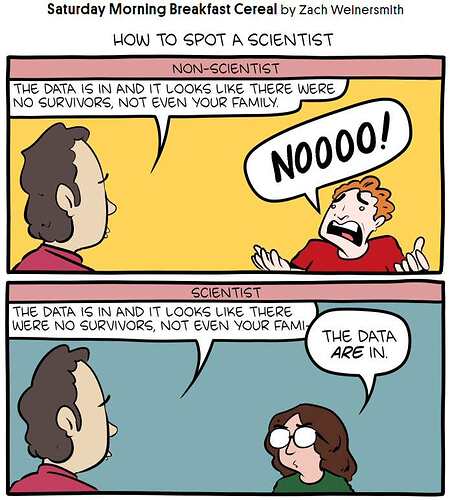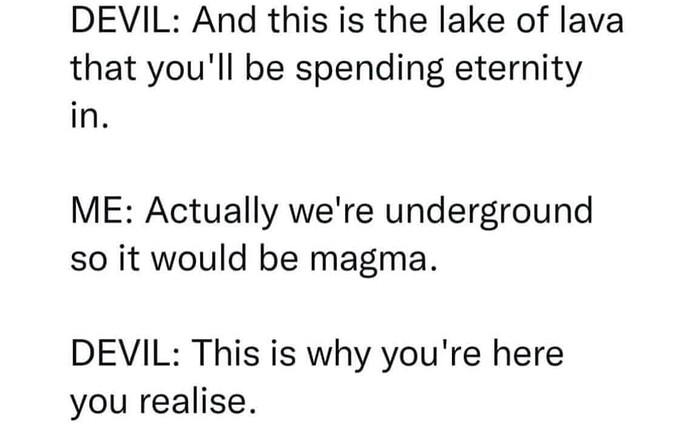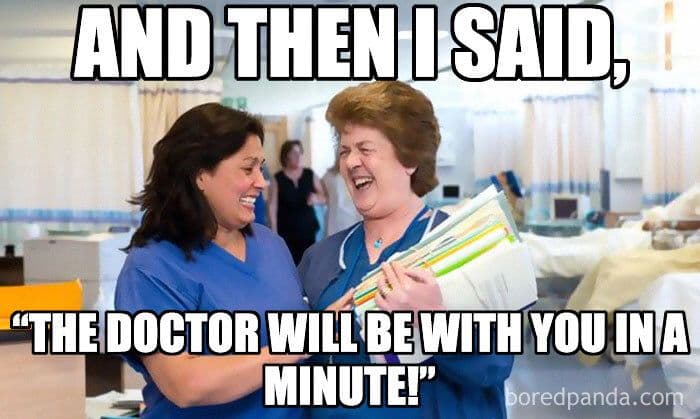Yep. Get with the program.
In the first frame, I would likely object “I’m part of my family.”
That is not unlike when you hear “No country in the world has this condition like the U.S.” Without the adjective “other” preceding “country”, one thing that says is that the U.S. is not a country. Or when someone says “No one is like him” without the adverb “else”, “him” is not a person (or whatever). (I probably should confess that I am the the son of an English teacher and am also married to one. ; - )
Ha, ha. Yeah the grammar Nazis would go after this too. They are the scientists of language. ![]()
One of my favorites is when a reporter from the big city goes up to Maine to do a local color story and finds an old gent and asks him if he has lived there all his life. (If you are telling this to someone else you have to use your best Maine accent here…) The old guy replies “Not yet!” (The word ‘yet’ is definitely two syllables said slowly with the second being half an octave lower. ; - )
Correction: How to spot an American scientist. ![]()
![]()
Do y’all (![]() ) say ‘the data is’? (I have trouble saying ‘are’ – it may be generational and what I grew up with, even with my mom being an English teacher.)
) say ‘the data is’? (I have trouble saying ‘are’ – it may be generational and what I grew up with, even with my mom being an English teacher.)
I was trained in Canada, and my Ph.D. supervisor pounded into my brain “data are” whenever I spoke incorrectly. So I’ve passed along the exact commentary as in the cartoon! Canada is a weird hybrid between British and American English, but in many aspects we default to the British grammar…
So in the UK data has always been singular and plural? Admittedly, my science education was in the US where it was drilled into my head that data is always plural and I had little exposure to the use of the word in science across the pond.
And just to add to the discussion here is what an article from 2012 in the Guardian has to say: Data are or data is? | Language | The Guardian whwre in the OED says this:
The Oxford English dictionary defines it like this:
In Latin, data is the plural of datum and, historically and in specialized scientific fields , it is also treated as a plural in English, taking a plural verb, as in the data were collected and classified . In modern non-scientific use, however , despite the complaints of traditionalists, it is often not treated as a plural. Instead, it is treated as a mass noun, similar to a word like information, which cannot normally have a plural and which takes a singular verb. Sentences such as data was (as well as data were ) collected over a number of years are now widely accepted in standard English.
I had a physics professor who when talking of a single study with a single data set treated “data” as singular, but when speaking of multiple studies and thus multiple data sets treated it as multiple – thus on the one hand “the data says” but on the other “the data say”.
Yeah, largely depends on who and where it is being used. “The data says” or, “the data say” I’ve seen/heard both.
Personally, I think the “the data say” or “the data indicate” look/sounds like a typo every time I read it. I’ve heard arguments from Latin grammar like from the Guardian before. The only problem is that (British) English doesn’t carry over the grammar rules for loan words. This is why the correct plural of octopus in English is actually octopuses, not octopi or octopods. So I vote for “the data indicates” as correct.
And of course, the purpose of language is not accuracy but effective communication (sorry grammar Nazis). I’d argue using data as a plural makes it harder, not easier, for people to understand what you’re trying to say. But that is just me, I don’t claim to speak for the whole of the UK on such matters. ![]()
Sometimes loading speeds suggest that this is already happening:
That’s funny! Although to be really anal, I guess your physics prof, when using the singular, should have said “the datum says”…?
Same here. I don’t care how “correct” it is – I’m never going to say it that way (and I’m a proofreader). Merriam-Webster says it’s “plural in form but singular or plural in construction.” So it’s perfectly fine to give “data” singular verbs since that’s what likely makes the most sense to the most people.
“realise” – speaking of differences between countries with respect to English diction and spelling. (Those are real lice as opposed to faux lice, right? And why do they pronounce schedule ‘shedule’ and not school ‘shule’? ![]() )
)
I already had a reply box ready, before I got to the punch line!
ARE
ARE
ARE
ARE
If there is a single unit of data, then yes, it would be “datum.”
Number of grapes in the bowl: 5.
That single quantity is a datum.
Once we start inventorying more types of things in my kitchen, then we are gathering data.
Yes:
“This data set from this study shows that toddlers prefer bananas to saurkraut.”
“Set” is the singular noun for which the verb “to show” is conjugated.
NO!!!:
“The data from this study shows that toddlers prefer bananas to saurkraut.”
“Data” is the plural noun for which the verb “to show” is conjugated. The sentence should be “The data from this study show that toddlers prefer bananas to saurkraut.”
If one can do basic algebra, one can do basic grammar. The mental processes are nearly the same.
The mental processes are nearly the same.
Is? ![]() (kidding!)
(kidding!)




